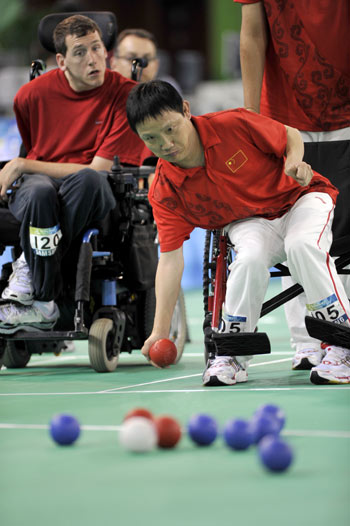A Chinese chess master turned his interest into a brand-new sport for people with disabilities, and made his debut at the Paralympic Games in Beijing.
 Wang Yi (R) from China competes in the boccia mixed individual - BC1 group A in the 2008 Paralympic Games on Sunday. [Xinhua]
Wang Yi (R) from China competes in the boccia mixed individual - BC1 group A in the 2008 Paralympic Games on Sunday. [Xinhua] |
The 45-year-old Wang Yi with inborn cerebral palsy found it was out of his expectation after he won two matches in a row out of three in the Mixed Individual - BC1 Group A on Sunday.
"My performance was just OK," Wang said modestly, but with a big smile.
"His performance today was quite stable. In his second match, he threw some balls with good quality, and I've never seen him do that before," said Wang's coach Tian Jiannan.
Wang started playing boccia in October, 2004 and one month later he competed in the National Championships.
However, before he was enrolled in the Chinese team in 2006, Wang earned his fame in the China Disabled Persons' Federation not because of his sport potential, but his amazing skills in Chinese chess.
Wang was born in an ordinary family in Beijing and he became interested in Chinese chess when he was in the primary school. Wang played chess with neighbors at home and other local residents in parks.
Eventually, people found it was hard to beat him.
In 2001, Wang was crowned at the Beijing Chinese Chess Championships and became the first one with CP to beat able people.
"There are some similarities between boccia and Chinese chess. If you want to play good boccia, you also must be strong in mental status," said Wang.
"Playing Chinese chess is a slow motion, but in boccia, you will be more active in physical status."
Boccia is a traditional recreational sport dating back to the ancient Greeks - a ball tossing game where points are awarded for accuracy.
It is played in 42 countries and regions and is governed by the International Boccia Committee (IBC), under the Cerebral Palsy International Sports and Recreation Association.
"Boccia helps the athletes a great deal both in physical and mental status. After some training, some athletes can even abandon their wheelchairs and walk again," said Tian.
"And more importantly, the sport helps them to open up to the outside world and become optimistic in their attitude to life," he added.
Nevertheless, Wang felt it was too difficult to find a strong opponent to play chess with in the Chinese team.
"No one can beat him in our team, so he can't play chess now. He is unhappy with that," Tian said.
"He taught me how to play Chinese chess, but I can't even challenge him."